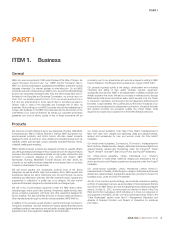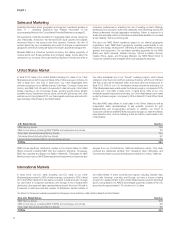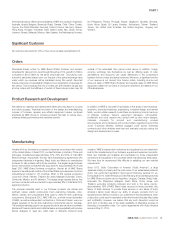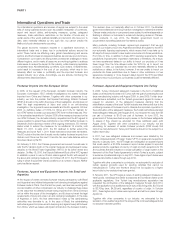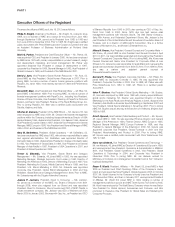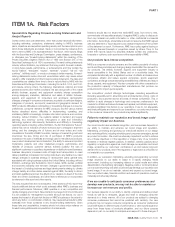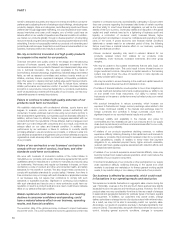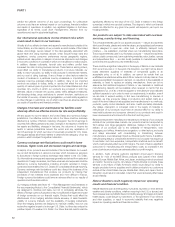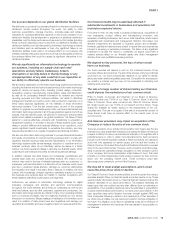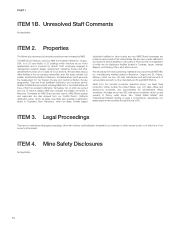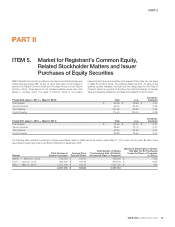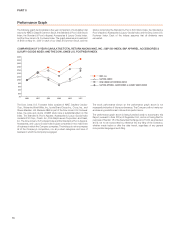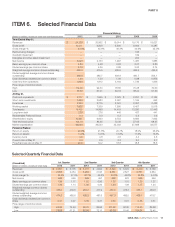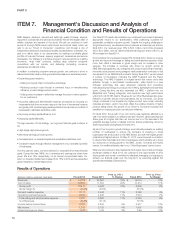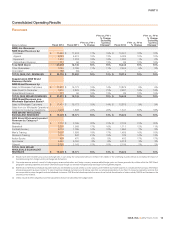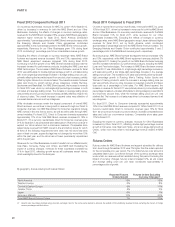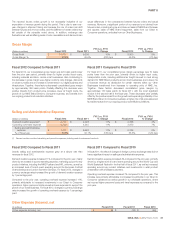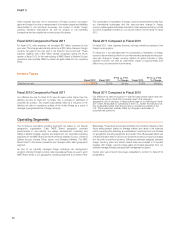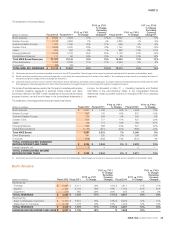Nike 2012 Annual Report Download - page 13
Download and view the complete annual report
Please find page 13 of the 2012 Nike annual report below. You can navigate through the pages in the report by either clicking on the pages listed below, or by using the keyword search tool below to find specific information within the annual report.PART I
Our success depends on our global distribution facilities.
We distribute our products to customers directly from the factory and through
distribution centers located throughout the world. Our ability to meet
customer expectations, manage inventory, complete sales and achieve
objectives for operating efficiencies depends on the proper operation of our
distribution facilities, the development or expansion of additional distribution
capabilities, and the timely performance of services by third parties (including
those involved in shipping product to and from our distribution facilities). Our
distribution facilities could be interrupted by information technology problems
and disasters such as earthquakes or fires. Any significant failure in our
distribution facilities could result in an adverse affect on our business. We
maintain business interruption insurance, but it may not adequately protect us
from adverse effects that could be caused by significant disruptions in our
distribution facilities.
We rely significantly on information technology to operate
our business, including our supply chain and retail
operations, and any failure, inadequacy, breach,
interruption or security failure of that technology or any
misappropriation of any data could harm our reputation or
our ability to effectively operate our business.
We are heavily dependent on information technology systems and networks,
including the Internet and third-party hosted services (“information technology
systems”), across our supply chain, including product design, production,
forecasting, ordering, manufacturing, transportation, sales, and distribution,
as well as for processing financial information for external and internal
reporting purposes and other business activities. Our ability to effectively
manage and maintain our inventory and to ship products to customers on a
timely basis depends significantly on the reliability of these information
technology systems. Over the last several years, as part of the ongoing
initiative to upgrade our worldwide supply chain, we have implemented new
information technology systems in all of the geographical regions in which we
operate. Over the next few years, we will work to continue to enhance these
systems and related processes in our global operations. The failure of these
systems to operate effectively, problems with transitioning to upgraded or
replacement systems, or a breach in security of these systems could cause
delays in product fulfillment and reduced efficiency of our operations, could
require significant capital investments to remediate the problem, and may
have an adverse effect on our results of operations and financial condition.
We also use information technology systems to process financial information
and results of operations for internal reporting purposes and to comply with
regulatory financial reporting, legal and tax requirements. If our information
technology systems suffer severe damage, disruption or shutdown and our
business continuity plans do not effectively resolve the issues in a timely
manner, we could experience delays in reporting our financial results, which
could result in lost revenues and profits, as well as reputational damage.
In addition, hackers and data thieves are increasingly sophisticated and
operate large scale and complex automated attacks. Any breach of our
network may result in the loss of valuable business data, our customers’ or
employees’ personal information or a disruption of our business, which could
give rise to unwanted media attention, damage our customer relationships
and reputation and result in lost sales, fines or lawsuits. In addition, we must
comply with increasingly complex regulatory standards enacted to protect
this business and personal data. An inability to maintain compliance with
these regulatory standards could subject us to legal risks.
Furthermore, we depend on information technology systems for digital
marketing campaigns and activities and electronic communications
throughout the world between and among our employees as well as with
other third parties, such as other customers, suppliers and consumers. Our
information technology systems are critical to many of our operating activities
and our business processes may be negatively impacted by any service
interruption or shutdown. Misuse, leakage or falsification of information could
result in a violation of data privacy laws and regulations and damage our
reputation and credibility and have a negative impact on revenues and profits.
Our financial results may be adversely affected if
substantial investments in businesses and operations fail
to produce expected returns.
From time to time, we may invest in business infrastructure, acquisitions of
new businesses, product offering and manufacturing innovation, and
expansion of existing businesses, such as our retail operations, which require
substantial cash investments and management attention. We believe cost
effective investments are essential to business growth and profitability.
However, significant investments are subject to typical risks and uncertainties
inherent in acquiring or expanding a business. The failure of any significant
investment to provide the returns or profitability we expect could have a
material adverse effect on our financial results and divert management
attention from more profitable business operations.
We depend on key personnel, the loss of whom would
harm our business.
Our future success will depend in part on the continued service of key
executive officers and personnel. The loss of the services of any key individual
could harm us. Our future success also depends on our ability to identify,
attract and retain additional qualified personnel. Competition for employees in
our industry is intense and we may not be successful in attracting and
retaining such personnel.
The sale of a large number of shares held by our Chairman
could depress the market price of our common stock.
Philip H. Knight, Co-founder and Chairman of our Board of Directors,
beneficially owns over 74.8% of our Class A Common Stock. If all of his
Class A Common Stock were converted into Class B Common Stock,
Mr. Knight would own over 15.5% of our Class B Common Stock. These
shares are available for resale, subject to the requirements of the U.S.
securities laws. The sale or prospect of the sale of a substantial number of
these shares could have an adverse effect on the market price of our
common stock.
Anti-takeover provisions may impair an acquisition of the
Company or reduce the price of our common stock.
There are provisions of our articles of incorporation and Oregon law that are
intended to protect shareholder interests by providing the Board of Directors
a means to attempt to deny coercive takeover attempts or to negotiate with a
potential acquirer in order to obtain more favorable terms. Such provisions
include a control share acquisition statute, a freeze-out statute, two classes of
stock that vote separately on certain issues, and the fact that holders of
Class A Common Stock elect three-fourths of the Board of Directors rounded
down to the next whole number. However, such provisions could discourage,
delay or prevent an unsolicited merger, acquisition or other change in control
of our company that some shareholders might believe to be in their best
interests or in which shareholders might receive a premium for their common
stock over the prevailing market price. These provisions could also
discourage proxy contests for control of the Company.
We may fail to meet analyst expectations, which could
cause the price of our stock to decline.
Our Class B Common Stock is traded publicly, and at any given time various
securities analysts follow our financial results and issue reports on us. These
reports include information about our historical financial results as well as the
analysts’ estimates of our future performance. The analysts’ estimates are
based upon their own opinions and are often different from our estimates or
expectations. If our operating results are below the estimates or expectations
of public market analysts and investors, our stock price could decline. In the
past, securities class action litigation has been brought against NIKE and
other companies following a decline in the market price of their securities. If
our stock price is volatile, we may become involved in this type of litigation in
the future. Any litigation could result in substantial costs and a diversion of
management’s attention and resources that are needed to successfully run
our business.
NIKE, INC. Š2012 Form 10-K 13


